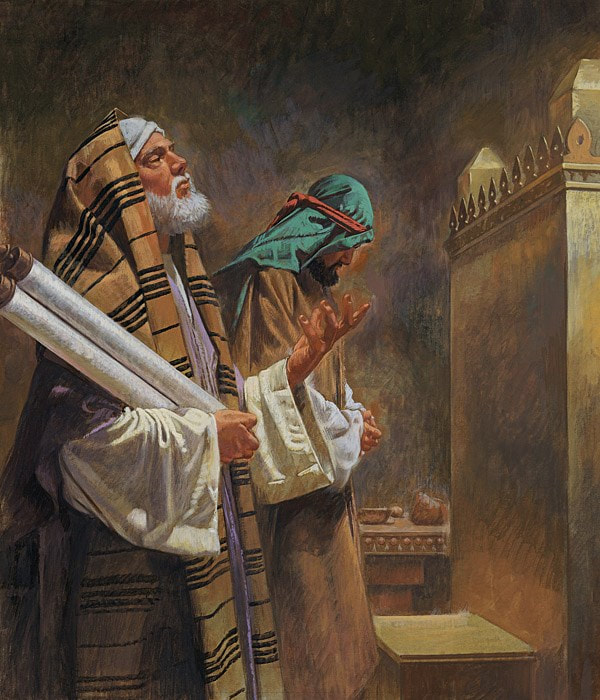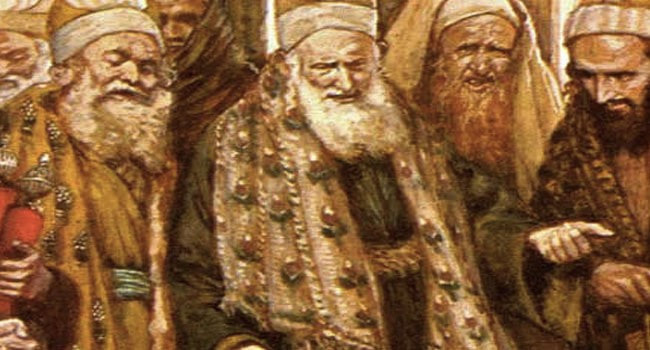The Pharisee and the Tax Collector
Pride versus Humility
Pride versus Humility
Luk 18:9 And he spake this parable unto certain which trusted in themselves that they were righteous, and despised others:
Luk 18:10 Two men went up into the temple to pray; the one a Pharisee, and the other a publican.
Luk 18:11 The Pharisee stood and prayed thus with himself, God, I thank thee, that I am not as other men are, extortioners, unjust, adulterers, or even as this publican.
Luk 18:12 I fast twice in the week, I give tithes of all that I possess.
Luk 18:13 And the publican, standing afar off, would not lift up so much as his eyes unto heaven, but smote upon his breast, saying, God be merciful to me a sinner.
Luk 18:14 I tell you, this man went down to his house justified rather than the other: for every one that exalteth himself shall be abased; and he that humbleth himself shall be exalted.
Two men went up to the temple to pray: Both men prayed, but both men did not come to God the same way. The Pharisee and his prayer were entirely self-centered; he prayed thus with himself, and in his short prayer he repeats I five times.
i. It is entirely possible to address your words to God, but actually be praying to yourself, because your focus is on yourself, not on God. Your passion is for your agenda, not God’s. Your attitude is mine will be done not Thy will be done.
ii. God, I thank You that I am not like other men: How could the Pharisee have such a high opinion of himself? It isn’t hard when you compare yourself to man (even as this tax collector). You can always find someone worse.
iii. I fast twice a week: In those days many Jews fasted on the second and fifth days of each week, because they believed that Moses went up on Mount Sinai to receive the law on the fifth day of the week, and that he came down with the law on the second day of the week.
iv. “What the Pharisee said about himself was true. His trouble was not that he was not far enough along the road, but that he was on the wrong road altogether.” (Morris)
c. We wonder how anyone could be so proud before God; but we really can be - though we cover it with a spiritual veneer. One Rabbi, Rabbi Simeon, the son of Jochai, exemplified this kind of Pharisaical pride when he said: “If there were only thirty righteous persons in the world, I and my son would make two of them; but if there were but twenty, I and my son would be of the number; and if there were but ten, I and my son would be of the number; and if there were but five, I and my son would be of the five; and if there were but two, I and my son would be those two; and if there were but one, myself should be that one.” (Clarke)
i. This is from an actual prayer of Rabbi Nehunia: “I give thanks to Thee, O Lord my God, that Thou has set my portion with those who sit in the House of Learning, and Thou hast not set my portion with those who sit in street corners, for I rise early and they rise early, but I rise early for words of Torah and they rise early for frivolous talk; I labor and they labor, but I labor and receive a reward and they labor and do not receive a reward; I run and they run, but I run to the life of the future world and they run to the pit of destruction.” (Morris)
d. The tax collector, standing afar off, would not so much as raise his eyes to heaven, but beat his breast, saying, “God, be merciful to me a sinner!” The Pharisee relied on his own power and deeds before God, but the tax collector relied on the mercy and compassion of God. He recognized that he was a sinner who needed the mercy of God.
i. We can imagine the Pharisee praying with eloquent words and flowing, spiritual style; anyone who heard him pray would say that he was a spiritual man. And the tax collector would pray awkwardly, with halting phrases and fear; but his prayer pleased to God.
e. Why would the tax collector beat his breast? The idea was that you were so aware of the sin and corruption of your heart that you would hit at your own heart as a punishment. The verb tense of beat his breast describes a continual action - he kept on doing it
i. The ancient Greek word for be merciful is hilaskomai; it is actually the word for an atoning sacrifice. The fullest sense of what the tax collector is saying is, “God, be merciful to me through Your atoning sacrifice for sins, because I am a sinner.” The only other place this word is used in the New Testament is in Heb_2:17, where it is translated propitiation.
f. This man went down to his house justified rather than the other: The justification of the tax collector was immediate. He humbly came to God on the basis of His atoning sacrifice, and was justified. He didn’t earn his justification, he didn’t have a probationary period; he was simply justified.
g. Jesus applies the message of the parable: everyone who exalts himself will be abased, and he who humbles himself will be exalted. Essentially, the Pharisee saw prayer and his spiritual life as a way to be exalted, but the tax collector approached God in humility.
i. True humbleness is simply seeing things the way they are. The Pharisee saw himself as something great when he wasn’t, and the tax collector saw himself as a sinner needing God’s mercy, which he was.
ii. We gain nothing by coming to God in the lie of pride. The principle God resists the proud, but gives grace to the humble is so important God repeats it three times in the Scriptures (Pro_3:34, Jas_4:6, 1Pe_5:5).
David Guzik
In my own study of these verses, some points come out:
1. The Pharisee revealed by his precise listing of his service to God-that he hadn't heard or heeded Jesus' teaching on the Sermon on the Mount:
Mat 6:1 Take heed that ye do not your alms before men, to be seen of them: otherwise ye have no reward of your Father which is in heaven.
Mat 6:2 Therefore when thou doest thine alms, do not sound a trumpet before thee, as the hypocrites do in the synagogues and in the streets, that they may have glory of men. Verily I say unto you, They have their reward.
Mat 6:3 But when thou doest alms, let not thy left hand know what thy right hand doeth:
Mat 6:4 That thine alms may be in secret: and thy Father which seeth in secret himself shall reward thee openly.
2. No word of self-depreciation comes from the lips of the Pharisee; not one word of self-praise from the publican. Self was the center of the Pharisee's thoughts.
3. The Pharisee was quick to cut short other men. He detached himself as a sinner-like other people-he stood above it; in his eyes. Pride and contempt of others are manifest.
Again, we can see the lack of true worship, or love for God or man in this discourse-and it's emptiness. When put beside Jesus' lessons to us on how we should pray:
Mat 6:5 And when thou prayest, thou shalt not be as the hypocrites are: for they love to pray standing in the synagogues and in the corners of the streets, that they may be seen of men. Verily I say unto you, They have their reward.
Mat 6:6 But thou, when thou prayest, enter into thy closet, and when thou hast shut thy door, pray to thy Father which is in secret; and thy Father which seeth in secret shall reward thee openly.
Mat 6:7 But when ye pray, use not vain repetitions, as the heathen do: for they think that they shall be heard for their much speaking.
Mat 6:8 Be not ye therefore like unto them: for your Father knoweth what things ye have need of, before ye ask him.
The publican made no mention of other men.
4. The publican was filled with self-shame and self-sorrow. His grieving heart lay between himself and God, not between other men.
5. The Pharisee displayed a well-brushed coat, and polished veneer, the publican pointed to a wounded heart.
6. The Pharisee saw separate points of excellence in himself, but the publican was stunned at the helplessness of his own condition-his flawed character.
7. The one was flippant, the other was reverent.
Point: Where there is no reverence-there is no worship.
What are the take-away lessons?
(1) That self-righteousness is unrighteousness;
(2) that self-trust is practical atheism;
(3) that social contempt is not personal piety;
(4) that self-boasting goes before destruction:
(5) that man’s only standing-ground before God is the ground of God’s sovereign mercy.
Jesus ends the parable saying "I tell you, this man (the publican) went down to his house justified rather than the other: for every one that exalteth himself shall be abased; and he that humbleth himself shall be exalted."
Yes, With his sins forgiven. His prayer was answered; not the proud boasts of the Pharisee. "This parable teaches us the spirit that should pervade our prayers. The first parable encourages us to pray, and faint not. The second reminds us how we ought to pray. Both should be often pondered by every true Christian.
Lorna Couillard
Luk 18:10 Two men went up into the temple to pray; the one a Pharisee, and the other a publican.
Luk 18:11 The Pharisee stood and prayed thus with himself, God, I thank thee, that I am not as other men are, extortioners, unjust, adulterers, or even as this publican.
Luk 18:12 I fast twice in the week, I give tithes of all that I possess.
Luk 18:13 And the publican, standing afar off, would not lift up so much as his eyes unto heaven, but smote upon his breast, saying, God be merciful to me a sinner.
Luk 18:14 I tell you, this man went down to his house justified rather than the other: for every one that exalteth himself shall be abased; and he that humbleth himself shall be exalted.
Two men went up to the temple to pray: Both men prayed, but both men did not come to God the same way. The Pharisee and his prayer were entirely self-centered; he prayed thus with himself, and in his short prayer he repeats I five times.
i. It is entirely possible to address your words to God, but actually be praying to yourself, because your focus is on yourself, not on God. Your passion is for your agenda, not God’s. Your attitude is mine will be done not Thy will be done.
ii. God, I thank You that I am not like other men: How could the Pharisee have such a high opinion of himself? It isn’t hard when you compare yourself to man (even as this tax collector). You can always find someone worse.
iii. I fast twice a week: In those days many Jews fasted on the second and fifth days of each week, because they believed that Moses went up on Mount Sinai to receive the law on the fifth day of the week, and that he came down with the law on the second day of the week.
iv. “What the Pharisee said about himself was true. His trouble was not that he was not far enough along the road, but that he was on the wrong road altogether.” (Morris)
c. We wonder how anyone could be so proud before God; but we really can be - though we cover it with a spiritual veneer. One Rabbi, Rabbi Simeon, the son of Jochai, exemplified this kind of Pharisaical pride when he said: “If there were only thirty righteous persons in the world, I and my son would make two of them; but if there were but twenty, I and my son would be of the number; and if there were but ten, I and my son would be of the number; and if there were but five, I and my son would be of the five; and if there were but two, I and my son would be those two; and if there were but one, myself should be that one.” (Clarke)
i. This is from an actual prayer of Rabbi Nehunia: “I give thanks to Thee, O Lord my God, that Thou has set my portion with those who sit in the House of Learning, and Thou hast not set my portion with those who sit in street corners, for I rise early and they rise early, but I rise early for words of Torah and they rise early for frivolous talk; I labor and they labor, but I labor and receive a reward and they labor and do not receive a reward; I run and they run, but I run to the life of the future world and they run to the pit of destruction.” (Morris)
d. The tax collector, standing afar off, would not so much as raise his eyes to heaven, but beat his breast, saying, “God, be merciful to me a sinner!” The Pharisee relied on his own power and deeds before God, but the tax collector relied on the mercy and compassion of God. He recognized that he was a sinner who needed the mercy of God.
i. We can imagine the Pharisee praying with eloquent words and flowing, spiritual style; anyone who heard him pray would say that he was a spiritual man. And the tax collector would pray awkwardly, with halting phrases and fear; but his prayer pleased to God.
e. Why would the tax collector beat his breast? The idea was that you were so aware of the sin and corruption of your heart that you would hit at your own heart as a punishment. The verb tense of beat his breast describes a continual action - he kept on doing it
i. The ancient Greek word for be merciful is hilaskomai; it is actually the word for an atoning sacrifice. The fullest sense of what the tax collector is saying is, “God, be merciful to me through Your atoning sacrifice for sins, because I am a sinner.” The only other place this word is used in the New Testament is in Heb_2:17, where it is translated propitiation.
f. This man went down to his house justified rather than the other: The justification of the tax collector was immediate. He humbly came to God on the basis of His atoning sacrifice, and was justified. He didn’t earn his justification, he didn’t have a probationary period; he was simply justified.
g. Jesus applies the message of the parable: everyone who exalts himself will be abased, and he who humbles himself will be exalted. Essentially, the Pharisee saw prayer and his spiritual life as a way to be exalted, but the tax collector approached God in humility.
i. True humbleness is simply seeing things the way they are. The Pharisee saw himself as something great when he wasn’t, and the tax collector saw himself as a sinner needing God’s mercy, which he was.
ii. We gain nothing by coming to God in the lie of pride. The principle God resists the proud, but gives grace to the humble is so important God repeats it three times in the Scriptures (Pro_3:34, Jas_4:6, 1Pe_5:5).
David Guzik
In my own study of these verses, some points come out:
1. The Pharisee revealed by his precise listing of his service to God-that he hadn't heard or heeded Jesus' teaching on the Sermon on the Mount:
Mat 6:1 Take heed that ye do not your alms before men, to be seen of them: otherwise ye have no reward of your Father which is in heaven.
Mat 6:2 Therefore when thou doest thine alms, do not sound a trumpet before thee, as the hypocrites do in the synagogues and in the streets, that they may have glory of men. Verily I say unto you, They have their reward.
Mat 6:3 But when thou doest alms, let not thy left hand know what thy right hand doeth:
Mat 6:4 That thine alms may be in secret: and thy Father which seeth in secret himself shall reward thee openly.
2. No word of self-depreciation comes from the lips of the Pharisee; not one word of self-praise from the publican. Self was the center of the Pharisee's thoughts.
3. The Pharisee was quick to cut short other men. He detached himself as a sinner-like other people-he stood above it; in his eyes. Pride and contempt of others are manifest.
Again, we can see the lack of true worship, or love for God or man in this discourse-and it's emptiness. When put beside Jesus' lessons to us on how we should pray:
Mat 6:5 And when thou prayest, thou shalt not be as the hypocrites are: for they love to pray standing in the synagogues and in the corners of the streets, that they may be seen of men. Verily I say unto you, They have their reward.
Mat 6:6 But thou, when thou prayest, enter into thy closet, and when thou hast shut thy door, pray to thy Father which is in secret; and thy Father which seeth in secret shall reward thee openly.
Mat 6:7 But when ye pray, use not vain repetitions, as the heathen do: for they think that they shall be heard for their much speaking.
Mat 6:8 Be not ye therefore like unto them: for your Father knoweth what things ye have need of, before ye ask him.
The publican made no mention of other men.
4. The publican was filled with self-shame and self-sorrow. His grieving heart lay between himself and God, not between other men.
5. The Pharisee displayed a well-brushed coat, and polished veneer, the publican pointed to a wounded heart.
6. The Pharisee saw separate points of excellence in himself, but the publican was stunned at the helplessness of his own condition-his flawed character.
7. The one was flippant, the other was reverent.
Point: Where there is no reverence-there is no worship.
What are the take-away lessons?
(1) That self-righteousness is unrighteousness;
(2) that self-trust is practical atheism;
(3) that social contempt is not personal piety;
(4) that self-boasting goes before destruction:
(5) that man’s only standing-ground before God is the ground of God’s sovereign mercy.
Jesus ends the parable saying "I tell you, this man (the publican) went down to his house justified rather than the other: for every one that exalteth himself shall be abased; and he that humbleth himself shall be exalted."
Yes, With his sins forgiven. His prayer was answered; not the proud boasts of the Pharisee. "This parable teaches us the spirit that should pervade our prayers. The first parable encourages us to pray, and faint not. The second reminds us how we ought to pray. Both should be often pondered by every true Christian.
Lorna Couillard
Points to Ponder
A short lesson on evaluating character
How you handle another persons mistakes, reveals more about you
than them.
A short lesson on evaluating character
How you handle another persons mistakes, reveals more about you
than them.
Mat 26:3 Then assembled together the chief priests, and the scribes, and the elders of the people, unto the palace of the high priest, who was called Caiaphas,
Mat 26:4 And consulted that they might take Jesus by subtilty, and kill him.
Mat 26:4 And consulted that they might take Jesus by subtilty, and kill him.
1. At the first sign of weakness, the evil scheming, slandering man will separate from himself from you. Putting his own reputation above your relationship.
2. At the first sign of weakness, the bully will start to pounce. Though he might have appeared innocent before, now his true nature comes out. Like sharks swimming in water, they will not bother each other. But when one starts to bleed, all come in for the feast. The bully will often confront you in the presence of others, to maximize your shame.
3. The Assassin will not wait until the first sign of weakness appears, he will actively search out your faults, and delights when he finds one. With the appearance of looking for truth, and defending what is right, he is really a predator at heart. And he will actively spread whatever dirt he finds about you, with everyone, in order to discredit you.
4. But at the first sign of weakness, a friend will not attack you; because out of love, his concern is for your restoration. Then at an appropriate time, will advise you of your mistake. See 2Sam 12:1-14, Psa 51:1
In this society today-this a very prevalent tactic-just as it was in Jesus time-and the same maneuver's that were used to trap, and kill him.
A modern example: When people track, surveille, and bug your home, track your vehicle, hack into your computer-with the sole purpose of trying to find all the dirt they can dig up, and use to try to destroy you. Your private life, your communications, your failures, temptations, anything from your past that you may have already confessed to God, and been forgiven for-but these people do not care-it's fodder that they will use to destroy you, if they can. They will murder your character, and your life, if you let them.
Nothing has changed in how the devil works, only more depraved, and more ways to do it.
2. At the first sign of weakness, the bully will start to pounce. Though he might have appeared innocent before, now his true nature comes out. Like sharks swimming in water, they will not bother each other. But when one starts to bleed, all come in for the feast. The bully will often confront you in the presence of others, to maximize your shame.
3. The Assassin will not wait until the first sign of weakness appears, he will actively search out your faults, and delights when he finds one. With the appearance of looking for truth, and defending what is right, he is really a predator at heart. And he will actively spread whatever dirt he finds about you, with everyone, in order to discredit you.
4. But at the first sign of weakness, a friend will not attack you; because out of love, his concern is for your restoration. Then at an appropriate time, will advise you of your mistake. See 2Sam 12:1-14, Psa 51:1
In this society today-this a very prevalent tactic-just as it was in Jesus time-and the same maneuver's that were used to trap, and kill him.
A modern example: When people track, surveille, and bug your home, track your vehicle, hack into your computer-with the sole purpose of trying to find all the dirt they can dig up, and use to try to destroy you. Your private life, your communications, your failures, temptations, anything from your past that you may have already confessed to God, and been forgiven for-but these people do not care-it's fodder that they will use to destroy you, if they can. They will murder your character, and your life, if you let them.
Nothing has changed in how the devil works, only more depraved, and more ways to do it.









